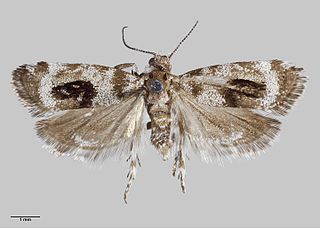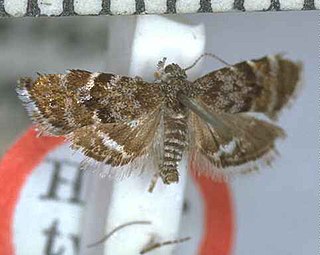Technographa is a genus of moth in the family Lecithoceridae. It contains the species Technographa ephestris, which is found in Sri Lanka.
Tortyra sporodelta is a moth of the family Choreutidae. It is known from Peru and Costa Rica.
Tortyra malacozona is a moth of the family Choreutidae. It is known from Peru and Costa Rica.
Tortyra chalcobathra is a moth of the family Choreutidae. It is known from Brazil.
Telosphrantis is a genus of moths in the family Choreutidae, containing only one species, Telosphrantis aethiopica, which is known from Ethiopia.
Tebenna immutabilis is a moth of the family Choreutidae. It is known from the United States, including California.

Asterivora exocha is a species of moth in the family Choreutidae. It was first described by Edward Meyrick in 1907 and is endemic to New Zealand. This species has only been observed in the Humboldt Ranges of Otago and inhabits subalpine native bush at elevations of around 3600 ft. Adults of this species are on the wing in December and January and have been observed flying at dusk.

Asterivora inspoliata is a species of moth in the family Choreutidae. It is endemic to New Zealand and has been found in the southern parts of the South Island. Adults are on the wing in December and January.

Asterivora marmarea is a species of moth in the family Choreutidae. It is endemic to New Zealand and lives in mountainous habitats. It has been observed in the lower parts of the North Island and the upper South Island. The larval host of this species is Celmisia gracilenta and adults of this species are on the wing in December and January.
Choreutis dryodora is a species of moth in the family Choreutidae. It is found in Mozambique.
Brenthia leptocosma is a species of moth of the family Choreutidae. It is found on Mauritius and Réunion in the Indian Ocean.

Brenthia caelicola is a species of moth of the family Choreutidae. It was described by Edward Meyrick in 1910. It is found on the Kai Islands of Indonesia.
Brenthia salaconia is a species of moth of the family Choreutidae. It was described by Edward Meyrick in 1910. It is found on the Kai Islands of Indonesia.
Brenthia spintheristis is a species of moth of the family Choreutidae. It was described by Edward Meyrick in 1910. It is found on the Kei Islands of Indonesia.
Brenthia thoracosema is a species of moth of the family Choreutidae. It was described by Alexey Diakonoff in 1982. It is found in Sri Lanka.
Helcystogramma amethystium is a moth in the family Gelechiidae. It was described by Edward Meyrick in 1906. It is known from India and Sri Lanka.
Helcystogramma anthistis is a moth in the family Gelechiidae. It was described by Edward Meyrick in 1929. It is known from Sri Lanka.
Heteralcis molybdantha is a moth in the family Lecithoceridae. It was described by Edward Meyrick in 1908. It is found in Sri Lanka.

Pammene ochsenheimeriana is a moth belonging to the family Tortricidae. The species was first described by Friederike Lienig and Philipp Christoph Zeller in 1846.

Epiblema costipunctana is a species of moth belonging to the family Tortricidae. It is native to Europe.





